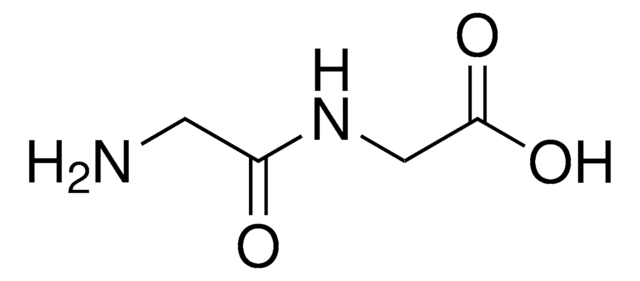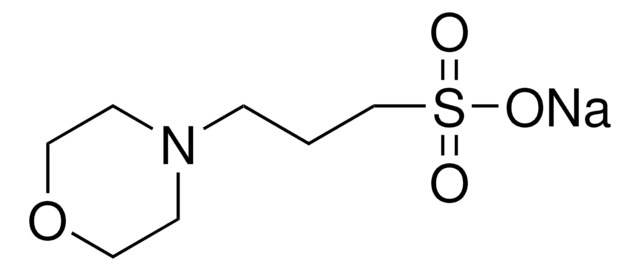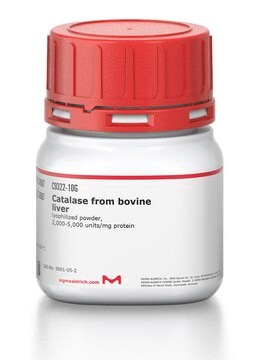69947
MOPS
≥99.5% (titration), powder or crystals, for molecular biology, BioUltra
Sinónimos:
Ácido 3-(N-morfolino)propanosulfónico, Ácido 4-morfolinopropanosulfónico
About This Item
Productos recomendados
product name
MOPS, BioUltra, for molecular biology, ≥99.5% (titration)
grade
for molecular biology
Quality Level
product line
BioUltra
assay
≥99.5% (titration)
form
powder or crystals
impurities
DNases, none detected
RNases, none detected
insoluble matter, passes filter test
phosphatases, none detected
proteases, none detected
ign. residue
≤0.1% (as SO4)
loss
≤1% loss on drying, 110 °C
pH
2.5-4.0 (25 °C, 1 M in H2O)
useful pH range
6.5-7.9
pKa (25 °C)
7.2
solubility
H2O: 1 M at 20 °C, clear, colorless
anion traces
chloride (Cl-): ≤50 mg/kg
sulfate (SO42-): ≤50 mg/kg
cation traces
Al: ≤5 mg/kg
As: ≤0.1 mg/kg
Ba: ≤5 mg/kg
Bi: ≤5 mg/kg
Ca: ≤10 mg/kg
Cd: ≤5 mg/kg
Co: ≤5 mg/kg
Cr: ≤5 mg/kg
Cu: ≤5 mg/kg
Fe: ≤5 mg/kg
K: ≤50 mg/kg
Li: ≤5 mg/kg
Mg: ≤5 mg/kg
Mn: ≤5 mg/kg
Mo: ≤5 mg/kg
Na: ≤50 mg/kg
Ni: ≤5 mg/kg
Pb: ≤5 mg/kg
Sr: ≤5 mg/kg
Zn: ≤5 mg/kg
λ
1 M in H2O
UV absorption
λ: 260 nm Amax: 0.020
λ: 280 nm Amax: 0.015
SMILES string
OS(=O)(=O)CCCN1CCOCC1
InChI
1S/C7H15NO4S/c9-13(10,11)7-1-2-8-3-5-12-6-4-8/h1-7H2,(H,9,10,11)
InChI key
DVLFYONBTKHTER-UHFFFAOYSA-N
¿Está buscando productos similares? Visita Guía de comparación de productos
Categorías relacionadas
General description
Application
- as a component of Roswell Park Memorial Institute (RPMI) medium for diluting fungal inoculum
- as a buffer in capillary-zone electrophoresis to test performance
- for the dilution of proteins from algal samples
Other Notes
Storage Class
13 - Non Combustible Solids
wgk_germany
WGK 1
flash_point_f
230.0 °F - closed cup
flash_point_c
110 °C - closed cup
ppe
dust mask type N95 (US), Eyeshields, Gloves
Elija entre una de las versiones más recientes:
¿Ya tiene este producto?
Encuentre la documentación para los productos que ha comprado recientemente en la Biblioteca de documentos.
Los clientes también vieron
Nuestro equipo de científicos tiene experiencia en todas las áreas de investigación: Ciencias de la vida, Ciencia de los materiales, Síntesis química, Cromatografía, Analítica y muchas otras.
Póngase en contacto con el Servicio técnico





